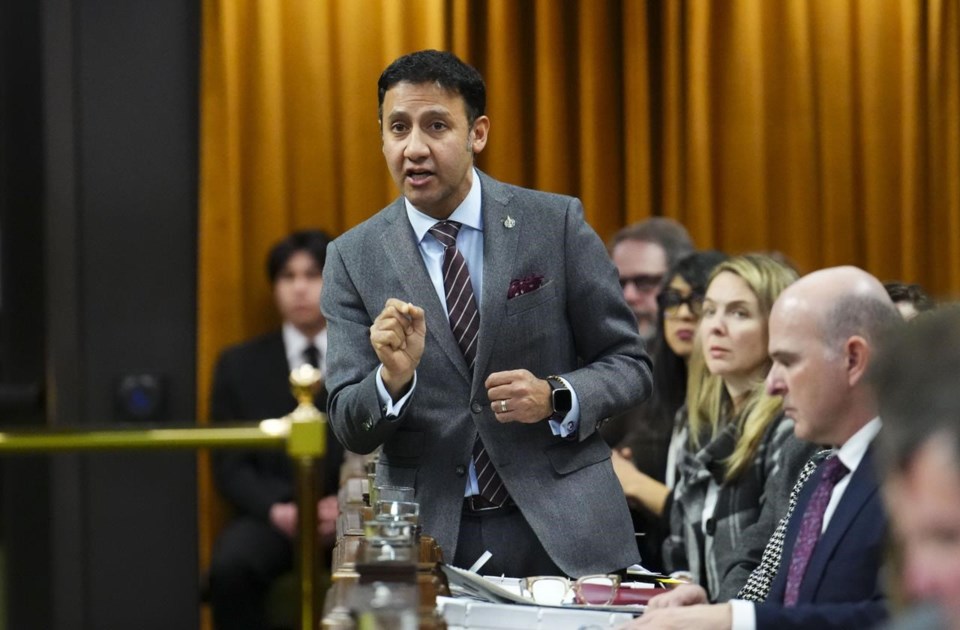OTTAWA — Canada's justice minister is rejecting charges that the federal government is perpetuating mental-illness stereotypes by delaying a planned expansion of medical assistance in dying.
Arif Virani says allowing access to an assisted death solely on the basis of a mental disorder is a complex endeavour — and that's the only reason for the delay.
The Liberals believe that intolerable mental suffering is equal to that of physical suffering and warrant equal access to a health service, Virani said. He outlined how the government believes providing an assisted death to someone suffering solely from mental illness is markedly different than other situations.
"We have to make triple sure that we've got the rigorous assessment and training that are in place so that people can make that evaluation — it's critical to get that evaluation right," he said.
"I don't think the Constitution mandates me or our government to provide a service, in this case a health-care service, when it is not safe to do so and that is our determination that it is not safe at this time."
Both he and Health Minister Mark Holland testified before the Senate, which is where the amendment to expand the law in 2021 to include mental illness originated.
Although expanding eligibility to cover mental illness was not in the government's original bill to update its 2016 law, Holland, who was not health minister at the time, told senators Wednesday that it simply wasn't an issue he knew much about.
The Liberals ultimately accepted the amendment, inking in a two-year window to prepare that they extended by another year last March.
Now, the government intends to delay it again, this time for up to three years — and must pass legislation to that effect before the change takes effect next month.
A committee of MPs and senators who studied the issue last fall had recommended a delay.
While professionals working in the area of medical assistance in dying testified that they were ready and had curriculum and practice standards in place, the committee also heard "significant testimony" about questions that remain unanswered, according to its final report.
Those included determining between someone who is experiencing thoughts of suicide and someone requesting an assisted death, as well as predicting whether an individual's mental illness will improve.
Holland pushed back against senators who suggested those questions may never be answered and justified an indefinite pause.
"Is there any number of decades where you ...would listen to that person and say, 'Yes, you've tried everything, and you have a right to access (medical assistance in death)?"
Holland said going into a meeting with health ministers from across the country last fall, he felt it was ready to move ahead.
But during that meeting, representatives from all 13 provinces and territories told him they needed more time, the minister said. He added that he heard from Indigenous leaders that consultation with communities on the matter wouldn't be finished until 2025.
Delaying it until 2027 pushes it far past when the next general election must happen by, which is no later than 2025.
Saskatchewan Sen. Pamela Wallin suggested if the government was serious about expanding eligibility, it wouldn't push it back until Canadians go to the polls, which she said runs the risk of seeing it not happen at all.
Opposition Conservative Leader Pierre Poilievre, who is leading in public opinion polls, has vowed to scrap plans for the expansion altogether.
"We can't make a decision on the off-chance that (Poilievre) and the politics that he represents are successful, to ram through things that aren't ready with potential consequences that are very serious," Holland said.
"If we make mistakes here, they are permanent and enormously consequential."
He said that if the government wanted to abandon the expansion altogether, it would have voted for a private member's bill brought before the House of Commons by a Conservative MP last fall that sought to do that.
Most provinces and territories also requested the Liberals take an indefinite pause, which the government rejected.
Critics of the expansion say it places vulnerable people at risk, while proponents — including several senators — say such statements perpetuate stereotypes about those living with mental illness and their ability to make decisions.
While senators pushed back against claims from provinces that their health systems were not ready because assisted-dying assessors and regulators said otherwise, Holland said not enough people have been trained.
Only about 40 clinicians have been trained on providing assisted-dying when it comes to severe mental illness and only two per cent of psychiatrists, Holland said.
Sen. Stan Kutcher of Nova Scotia, who advocated for the expansion, questioned whether any exceptions could be made for those in mental anguish who had been waiting for the expansion to happen and are now reeling from the fact that it's not.
This report by The Canadian Press was first published Feb. 14, 2024.
Stephanie Taylor, The Canadian Press

